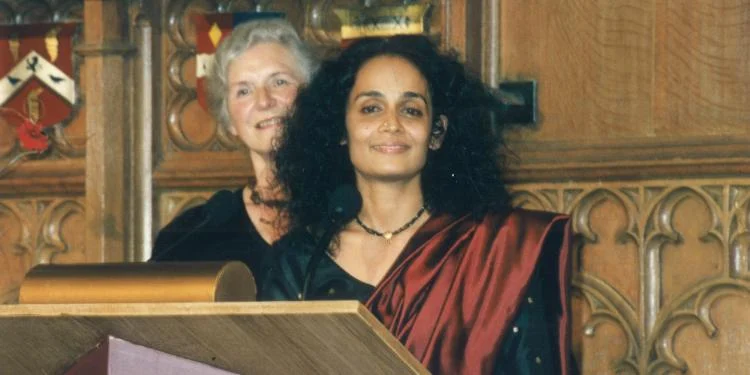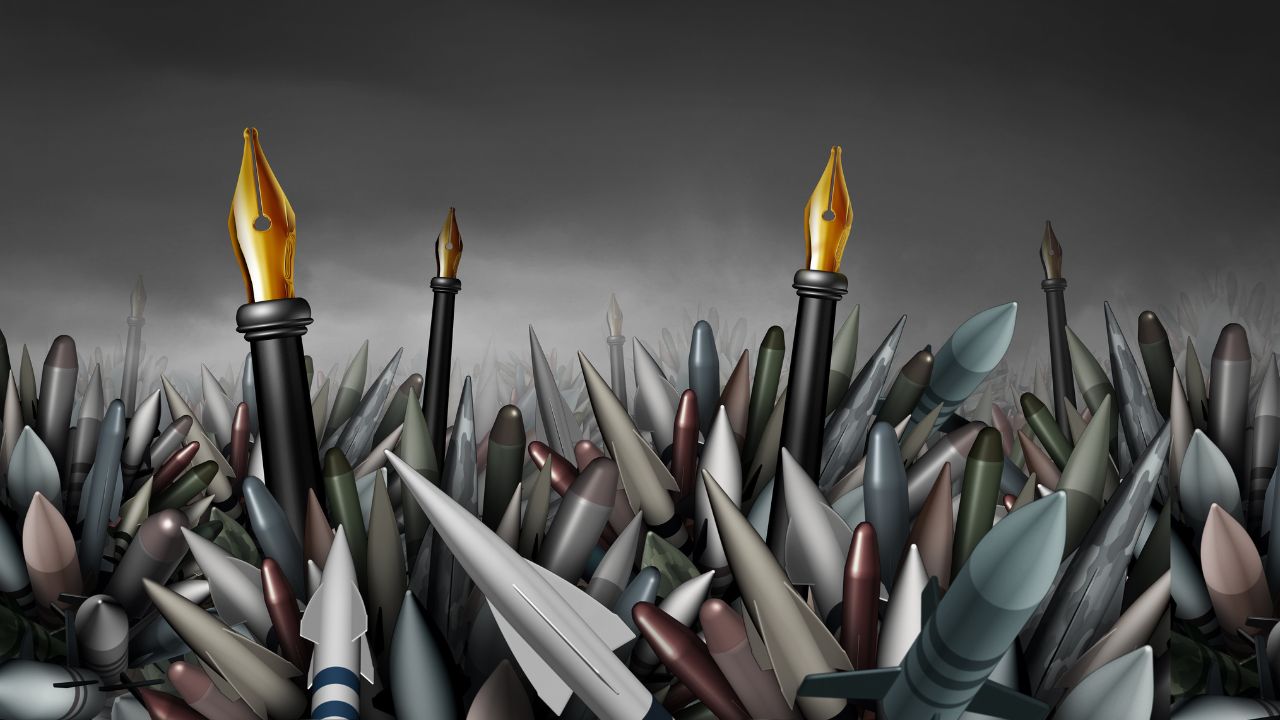Roy, Rooney and the perils of lit-activism
Editor’s note: Both Arundhati Roy and Sally Rooney achieved great literary fame at a young age. Then they set about dismantling the gilded cage of fame with their blunt, unapologetic politics. But ideological purity is hard to maintain in a world where books and authors are commodities. Does Roy’s trajectory offer a glimpse of what awaits her younger peer?
Written by: Devarsi Ghosh
In her recently released memoir, Mother Mary Comes to Me, this is how Arundhati Roy describes the moment she went onstage to receive the 1997 Booker for The God of Small Things: “I could clearly see the outline of a gilded cage. I knew that once I stepped in, it would snap shut behind me.”
Within a year, Roy detonated her cage, lambasting Vajpayee’s BJP-led NDA-I government for the Pokhran II nuclear tests and what she viewed as jingoistic militarism. In her 1998 essay The End of Imagination, Roy wrote:
If protesting against having a nuclear bomb implanted in my brain is anti-Hindu and anti-national, then I secede. I hereby declare myself an independent, mobile republic. I own no territory. I have no flag.
The rightwing instantly wanted to flay Roy, who had been a national darling just 12 months back. In Mother Mary, Roy looks back on these turbulent months as “the beginning of my restless, unruly life as a seditious, traitor-writer… I hadn’t just avoided the gilded cage. I had blown it to smithereens.”
 Separated by a generation and a continent, Sally Rooney has just about begun rattling her own gilded cage—in a world where, in George Orwell’s words, “two and two made five.” In August, Rooney pledged to donate proceeds from her book royalties to the activist group Palestine Action, recently designated by the UK as a terrorist organisation for vandalising the Royal Air Force’s aircraft.
Separated by a generation and a continent, Sally Rooney has just about begun rattling her own gilded cage—in a world where, in George Orwell’s words, “two and two made five.” In August, Rooney pledged to donate proceeds from her book royalties to the activist group Palestine Action, recently designated by the UK as a terrorist organisation for vandalising the Royal Air Force’s aircraft.
The UK government warned her that providing financial support to a proscribed group is a criminal offense under the Terrorism Act. Rooney—who lives in Ireland—will risk arrest if she enters the UK. Rooney doubled down by reiterating her “solidarity with the people of Palestine” in a letter read by her editor at an award ceremony in London last month.
Exactly 30 years younger, Rooney has just begun to tread Roy’s rebellious trail. Rooney, who never fails to call herself a Marxist, punches her novels of urban relationships with pointed critiques of capitalism. Not unlike Roy, she has taken aim at her government for the exploitation of renters in Ireland and abortion rights, or lack thereof. Rooney’s stance on the genocide in Gaza has remained as consistent—and gone far beyond penning an open letter or making a speech. In 2021, Rooney refused to let her novel Beautiful World, Where Are You be translated in Hebrew by an Israeli publisher.
In a 2023 Guardian interview, Rooney said:
We need to hold on to the very basic democratic principle that the exercise of individual agency becomes powerful en masse. I think there has been a real apathy in the past few decades about the importance of maintaining consensus around democratic principles, as if these will just continue to exist on their own without us fighting to keep them. People in the global north have short memories. These principles and institutions were really hard-won, and they arrived on the back of colossal global violence. The Geneva conventions, the Universal Declaration of Human Rights—these have been around for less than a century and they are becoming meaningless. This terrifies me. And it should terrify everyone—it has implications for everyone, not just Palestinians.
She sounds a lot like Roy, who wrote in her 2020 book of essays Azadi: “It's a battle of those who know how to think against those who know how to hate.” Roy has remained committed to radical activism across a wide number of issues over the years, from the Gujarat massacre to the Narmada Bachao Andolan and bloody campaigns against tribal communities (see: Operation Green Hunt).
Rooney and Roy have reinvented the wheel of literary rebellion for two separate generations. They have walked in paths pioneered by others, be it Toni Morrison in the United States or Mahasweta Devi, in India. These women focused on struggles in their immediate context—race for Morrison and tribal/labour rights for Mahasweta. Rooney and Roy, however, have set their sights on global systems—of capitalism, patriarchy and others—that sow and nurture various forms of violence.
Between Roy and Rooney, too, there is a key difference. While Roy is still at war with the Indian rightwing and the government, Rooney doesn’t have a similarly antagonistic relationship with the Irish government. Unlike Roy, Rooney has also not endured sharp and ongoing attacks from liberals and sections of the Left.
For example, critics have called out Roy for toning down her criticism of the Modi government, more so after sedition charges were brought against her in 2023. Last month, the Middle East Monitor pointed out that Penguin Random House, the publisher of Roy’s memoir, “is a global giant entangled in blood.” Its owner, the German group Bertelsmann, invests in Israeli technology.
Roy hasn’t been found to have publicly addressed these murmurs of complaints. In any case, this alleged connection of Penguin/Bertelsmann to Israeli tech reflects poorly upon Roy, the author of Capitalism: A Ghost Story, a stinging analysis on the impact of money.
Rooney is yet to run into these traps of being a literary activist. There can be worse fates. She could turn into Zadie Smith, who once drew acclaim for her insights on race, class and immigration in Britain only to be torn apart for a New Yorker essay criticising the rhetoric of pro-Palestine campus activists in the US, and their use of words such as ‘genocide’ and ‘Zionist’. Pitchforks and torches followed.
Rooney, just 34, has a long way to go. For now, however, she shows no sign of doing a Smith, or, lord help us, a JK Rowling. In a 2024 essay for The Irish Times, Rooney referenced Andreas Malm’s How to Blow Up a Pipeline, a book that advocates sabotage as a valid method of climate activism.
Of course, Rooney doesn’t need to water down her politics. The ‘mainstreaming’ imperative of global capitalism will do it for her. As a Jacobin essay by Anastasia Baucina notes of the anodyne BBC adaptation of her novel Normal People—bleached of any sign of Marxism— “The politics of Rooney’s novels are less a great red flag than a strand of red thread woven through a more complex composition — they have the potential to be picked out and set aside.” Authors don’t entirely control their narratives, especially those of their own lives.
***
You can find the links to all the books, essays and interviews mentioned in the article here:
- Mother Mary Comes to Me by Arundhati Roy
- The End of Imagination by Arundhati Roy
- Capitalism: A Ghost Story by Arundhati Roy
- Azadi by Arundhati Roy
- Konstantina Karageorgos on Toni Morrison’s activism for Jacobin
- Nawshin Flora on Mahasweta Devi’s legacy for The Daily Star
- Guardian interview: Sally Rooney and Isabella Hammad on the Israel-Palestine conflict
- Shibboleth by Zadie Smith for The New Yorker
- Sally Rooney on climate activism for The Irish Times
- How to Blow Up a Pipeline: Learning to Fight in a World on Fire by Andreas Malm
- Anastasia Baucina’s review of the Normal People adaptation for Jacobin
***
Devarsi Ghosh is Consultant Editor at Advisory.


 souk picks
souk picks